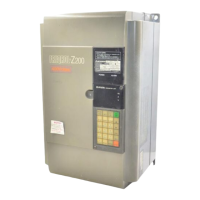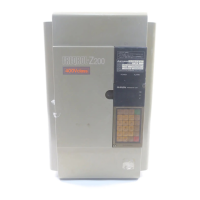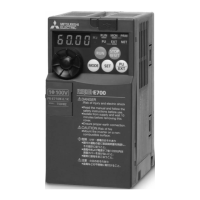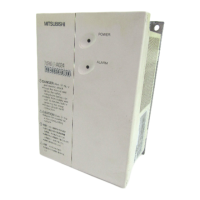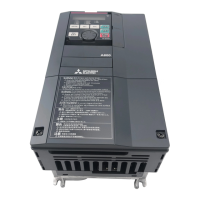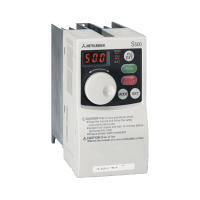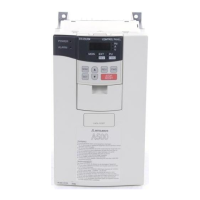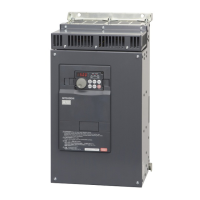Do you have a question about the Mitsubishi FREQROL-U100 and is the answer not in the manual?
Measures to prevent electric shock hazards, with warnings about high voltage terminals and capacitors.
Preventing fire risks by avoiding combustible materials, using circuit breakers, and proper wiring.
Avoiding physical injury by using correct voltage, handling hot parts, and proper wiring.
Safe practices for carrying, lifting, and installing the inverter to prevent damage or accidents.
Critical wiring rules, including using shielded wires and ensuring power is off before wiring.
Safety for trial runs and operation, covering retry functions, stop key usage, and thermal protection.
Procedures for emergency stops, maintenance tests, and safe disposal of the inverter.
General advice on inverter operation, ensuring covers are fitted and cooling is adequate.
Information on identifying the inverter model and its specifications from the front and side plates.
Explanation of the model designation codes for different inverter series, features, and configurations.
Identification and description of the main external parts of the inverter, including covers, key pad, and plates.
Instructions on how to safely remove and reattach the front cover for access to terminals.
Details on the exclusive wiring cover for totally enclosed types and how to cut it for wiring.
Guidelines for vertical installation and maintaining ambient temperature for optimal inverter performance.
Recommendations to avoid installing the inverter in direct sunlight, humid, dusty, or vibrating environments.
Specifications for the clearance space required around the inverter for proper ventilation and heat dissipation.
Key considerations to prevent incorrect wiring and ensure proper inverter function, including terminal usage.
Instructions for correctly connecting the main power supply and motor to the inverter terminals (R, S, T, U, V, W).
Guidance on wiring various control signals for operation, frequency setting, and alarm output.
Specifications for wire gauges and sheath peeling lengths required for terminal connections.
Important checks for wiring planning, including electrical and mechanical interlocks for safety.
Methods to prevent backflow current and ensure proper external power supply usage in wiring.
Overview of different methods for controlling the inverter: key pad, external signals, or combined.
Detailed explanation of how to start, stop, set frequency, and change modes using the inverter's key pad.
How to operate the inverter using external switches and potentiometers for start and frequency setting.
Procedures for monitoring inverter status and adjusting operational parameters via the key pad interface.
A table listing all available functions with their parameter numbers, setting ranges, and default values.
Detailed descriptions of key inverter functions like torque boost, frequency limits, V/F control, and acceleration/deceleration.
Technical specifications for the standard series of Mitsubishi FREQROL-U100 inverters, including capacity and voltage.
Technical specifications for the low-acoustic noise variants of the inverter, detailing performance differences.
Technical specifications for the single-phase 100V input models, covering power and performance.
Technical specifications for the single-phase 200V input models, including power and performance data.
General specifications applicable across various inverter models, covering control methods, stability, and protection.
Guidelines to avoid electromagnetic interference from power and signal cables.
Diagrams and methods for installing filters and separating cables to reduce noise.
Strategies to manage leakage current, including lowering carrier frequency and using appropriate breakers.
How carrier frequency settings affect noise levels and the need for AC reactor selection.
Diagram illustrating the connections for main power, motor, control signals, and output terminals.
Details on the purpose and connection requirements for main circuit terminals (R, S, T, U, V, W, Ground).
Explanation of control circuit terminals for input signals, output signals, frequency setting, and common connections.
Details on inverter protection against overcurrent during operation and overvoltage during regenerative braking.
Information on electronic thermal relay for motor overload and protection against EEPROM data loss.
How the inverter warns of low input voltage and procedures for resetting protective function stops.
Physical dimensions and mounting hole details for standard series inverter models.
Physical dimensions and mounting details for the low-acoustic noise series inverter models.
Physical dimensions and mounting specifications for the fully enclosed inverter types.
Physical dimensions for multi-function low-acoustic noise, fully enclosed inverter variants.
Guidelines for selecting appropriate peripheral devices like breakers and contactors based on inverter model.
Recommendations for selecting AC reactors and fuses based on power input, motor output, and wiring length.
Chronological list of revisions made to the instruction manual and their content.
| Brand | Mitsubishi |
|---|---|
| Model | FREQROL-U100 |
| Category | Inverter |
| Language | English |
